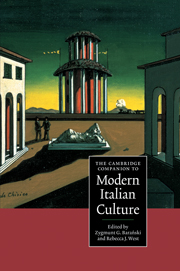Book contents
- Frontmatter
- Introducing modern Italian culture
- 1 The notion of Italy
- 2 Social and political cultures in Italy from 1860 to the present day
- 3 Questions of language
- 4 Intellectuals, culture and power in modern Italy
- 5 Catholicism
- 6 Socialism, Communism and other ‘isms’
- 7 Other voices: contesting the status quo
- 8 Narratives of self and society
- 9 Searching for new languages: modern Italian poetry
- 10 Drama: realism, identity and reality on stage
- 11 Italian cinema
- 12 Art in modern Italy: from the Macchiaioli to the Transavanguardia
- 13 A modern identity for a new nation: design in Italy since 1860
- 14 Fashion: narration and nation
- 15 The media
- 16 Since Verdi: Italian serious music 1860-1995
- 17 Folk music and popular song from the nineteenth century to the 1990s
- 18 Epilogue: Italian culture or multiculture in the new millennium?
- Index
- Series List
4 - Intellectuals, culture and power in modern Italy
Published online by Cambridge University Press: 28 May 2006
- Frontmatter
- Introducing modern Italian culture
- 1 The notion of Italy
- 2 Social and political cultures in Italy from 1860 to the present day
- 3 Questions of language
- 4 Intellectuals, culture and power in modern Italy
- 5 Catholicism
- 6 Socialism, Communism and other ‘isms’
- 7 Other voices: contesting the status quo
- 8 Narratives of self and society
- 9 Searching for new languages: modern Italian poetry
- 10 Drama: realism, identity and reality on stage
- 11 Italian cinema
- 12 Art in modern Italy: from the Macchiaioli to the Transavanguardia
- 13 A modern identity for a new nation: design in Italy since 1860
- 14 Fashion: narration and nation
- 15 The media
- 16 Since Verdi: Italian serious music 1860-1995
- 17 Folk music and popular song from the nineteenth century to the 1990s
- 18 Epilogue: Italian culture or multiculture in the new millennium?
- Index
- Series List
Summary
An idea of Italy
On the face of it, contemporary Italian intellectuals have a more prestigious existence than their Anglo-Saxon counterparts. Whether as writers, academics, journalists or film-directors, Italian intellectuals are courted by political parties of all persuasions to add lustre to their slates at election time, and wooed by the media as influential opinion makers. The contact Italian intellectuals have with the institutions of civil society comes from a long tradition going back to the Middle Ages. Indeed, Italian society has consistently relied on its intellectuals, rather than its political class, to supply the nation's agents for social change. When Dante, for example, in his De vulgari eloquentia examined the panoply of local dialects to find one on which to base a supraregional language for the peninsula, he turned to the literary idiom of his fellow poets, which seemed to him the only noble and unifying element present in an Italy rife with factionalism.
- Type
- Chapter
- Information
- The Cambridge Companion to Modern Italian Culture , pp. 81 - 96Publisher: Cambridge University PressPrint publication year: 2001
- 5
- Cited by

